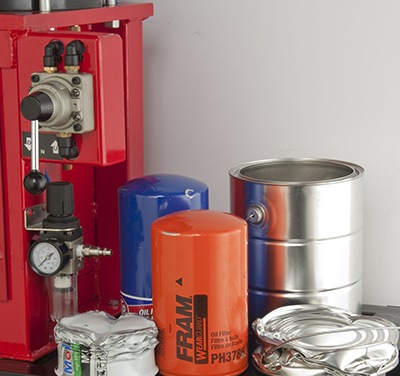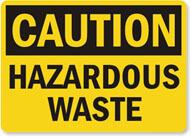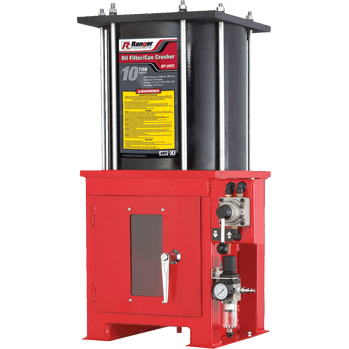Oil Filter Crushers and the Environment: The EPA has Tough Regulations about their Disposal

If you work in or own an auto repair shop, you likely find yourself burdened with hundreds, sometimes thousands of oil filters every year, all of them filled with sludge and used engine oil. Used oil filters removed from vehicles are viewed as contaminated waste by the EPA until they are processed for disposal or recycling, and the EPA has tough regulations about their disposal.
Comply with EPA guidelines
Used oil filters can be processed to recycle both the used oil and steel remains. The drained oil can be refined into lower grades of lubricating oils or fuel, and the steel scrap can be reprocessed into new steel products such as cans, cars, appliances and construction materials. Proper recycling of used oil filters sold annually in the United States could result in the recovery of about 160,000 tons of steel.
Recycling is the preferred alternative to disposal and using an oil filter crusher makes recycling efforts more productive and less costly. An oil filter crusher presses the filter under high pressure and squeezes the engine sludge, grunge and oil out. Within seconds, used filters are reduced to 25% of their original size—about the size of a hockey puck. The end result is a collection drum filled with recyclable metal “pucks” and a storage container of used oil that can be recycled, all while complying with EPA disposal guidelines. Because most disposal companies charge a collection and hauling fee for each drum, the more recycled filters you can fit into each drum, them more you’ll save. No permits will be required for either the collection or transportation of these filters if they are destined for recycling.
Reduce filters to 25% original size

Crushing used oil filters removes the residual oil while leaving the paper and rubber content of the filter with the resulting scrap product. No separate step for media disposal is required, as any nonmetallic material remains with the used oil filter and will get burned off as impurities in the steel making furnace. Repair shops who recycle both the used oil removed from the filter and the filter casing as scrap metal are exempt from hazardous waste regulations and do NOT need to test their filters to determine whether they are hazardous.
To increase the probability that a used oil filter (hazardous scrap metal) will qualify for the scrap metal recycling exemption, a repair shop generally has two options:
- Gravity-drain the filter for an amount of time sufficient to ensure that all free-flowing oil is removed. The problem with this method is that the amount of drain time will vary based on the size of the filter, temperature (both ambient and that of the filter) and fluid viscosity
- Alternately, the repair shop could crush the oil filter using the most appropriate crushing method that will force excess residual oil from the filter.
- Modern oil filter crushers like the Ranger RP-20FC and RP-50FC connect easily to your existing shop air supply and are designed specifically to crush dirty oil filters and remove up to 95% of the sludge and used engine oil. A collection chamber and collector downspout tube allow for simple oil recovery into a barrel or other collection container.

The Ranger RP-20FC oil filter crusher applies 10 tons of air-operated pressure to just about any used oil filter and reduces them to 25% of their original sizes. If you need more crushing power, the RP-50FC applies 25 tons of force. Both units feature single-control valve operation, welded steel plate construction, pressure regulator / air moisture separator and an automatic safety door that automatically ceases press operation when opened. A transparent door provides a convenient view of the crushing process.
Ranger oil filter crushers come with free shipping to almost anywhere in the United States. When you consider the cost savings for reducing the size of used oil filters, as well as the EPA’s special handling permits and fees that no longer apply, the investment will surely pay for itself very quickly.
It’s the law
Although many states require that used oil filters be drained for a period of 12 – 24 hours, uninformed repair shop operators find the process too time consuming and will typically gravity-drain the oil filters for only a few minutes before discarding them into the trash. Because a larger percentage of the oil could still remain in an improperly drained filter, it is still considered hazardous waste. Repair shop operators can be fined for improper or illegal hazardous waste management if disposing oil filters that have not been properly drained.
Because used oil is a harmful pollutant, all oil should be drained from used filters before they are recycled or disposed of. Used motor oil collected during processing used oil filters is not required to be regulated as a hazardous waste if it is properly managed and transferred to a recycling facility.

 BendPak USA
BendPak USA BendPak Australia
BendPak Australia BendPak UK
BendPak UK BendPak Mexico
BendPak Mexico BendPak South Africa
BendPak South Africa BendPak UAE
BendPak UAE Catalogs
Catalogs